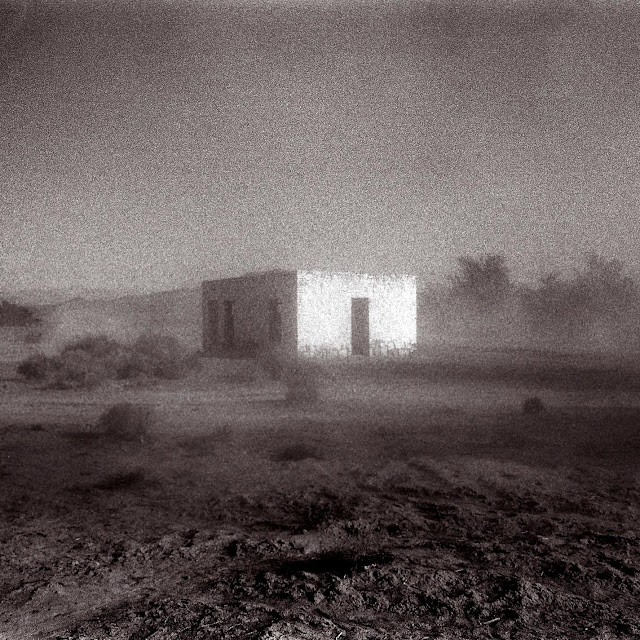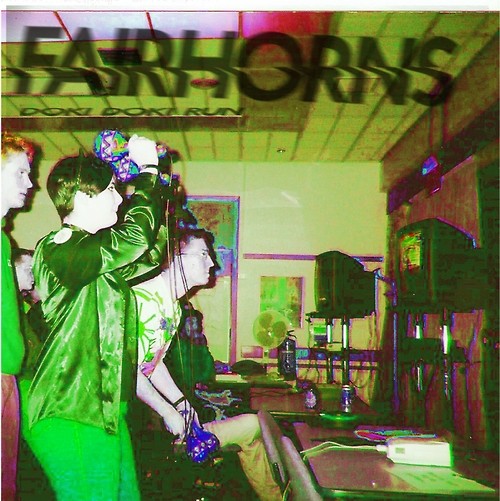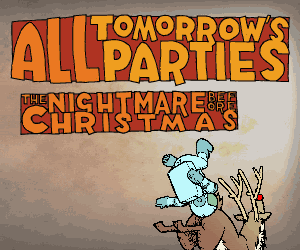
Banks is one of those compulsive creatives, ceaselessly striving to release. But with his every solo manoeuvre, the restrictive parameters of Interpol become ever more apparent. Just as the costume must be monochrome, the custom must also be seductively dark; commensurately so. And in many respects, Banks is to be deemed a work of two parts. Not halves distinguished by stark sides etched into 12" vinyl, but almost as though two banks. As with the solo début Julian Plenti Is... Skyscraper this one is appositely bisected, thus furthering the impression that his every work when scribing as one comes in two. Though that which bridges these banks is his inimitably roguish baritonal New York Siddy brogue. Nothing in modern music resonates quite like it.
It is in this tone that Banks dispels the validity of expectation on an unusually busy Over My Shoulder and, on such unexpected early evidence, it's difficult to maintain any expectations whatsoever as far as that which is to come may be concerned. This second track makes for a somewhat disorientating listen, so intensely overpopulated with innumerable layers is its construction. It's as overwhelming as one's first evening in Manhattan and, again, its lyrics only exacerbate this sense of great engulfment. Washes of Les Paul froth and foam beneath his profound and recurrent allegory: "You only hold me like the canyon holds the stream", he croons thereby hinting at some form of amour of inconveniencing convenience. So why so adrift, then? Well, because this lyrical coldness markedly contrasts the remarkably inviting, and with it oft warm pop mellifluousness to course beneath such snide. I feel lost at sea, tossed and turned by such conflicting messages.
I'll Sue You similarly – and this one is arguably the album's most interesting, if still impenetrable composition – intimates amorous antipathy: "I'm suing you, yes, I'll do this" he seethes on a skyscraper of a chorus. "It's a whole amount of lake, I want to be clear/ There's always a way and I don't want to be here" goes the close of its opening stanza atop what sounds faintly redolent of latter-day Manics, and so unerringly emotionless is his delivery that his words hiss with potent venom. It starts off with the incisive, and gently acerbic scratching of innumerable Thurston Moore recordings, only to soon start to sound like Barricade. This breeds familiarity, yet there's an unfamiliar vitriol to his every word; words from which we dangle as though infidels swaying, decelerating to still from a lofty noose. Lyrically, it's killer and is quite antithetical to the subtle, yet violent charms of, say, Take You On A Cruise.
Paid For That is akin to much of the Interpol discog, albeit mutilated to a lo-fi, off-kilter slant whilst No Mistakes pertains to the unimpeachably alike too. "I don't know what will happen next, but I'll wait for you" he's here documented as enunciating. Sonically, it may again sound au fait with his past and vocally too he's changed his tune to something more identifiably Banks. But in amongst this self-referencing are odd divergences from his tested methods, with the purely instrumental and almost orchestral (if post-rock may ever in turn be deemed thus) Lisbon among these isolated occasions. It builds and builds like an empyrean W&H Properties, and not in fact state-owned building; constructed from twinkly hi-hats and jingling guitars that ebb and flow murkily as may the Hudson about this time o' year.
And indeed much like his now native New York, he is a man of many parts – Lisbon only attests further to this actuality. For Banks is both he who trawls the unfathomed depths of human emotion and insecurity to fish out the species' most sequestered thoughts and fears, as well as he who sits on the volcanic sands of Central America and surfs in its lukewarm waves, board by board with supermodel inamorata Helena Christensen. He is both Paul Banks, and his unknowable pseudonym Julian Plenti – a name seemingly derived from his penchant for the Panamanian. It is consequently fitting, therefore, for this particular record – one he's opted to put his own name on – to be composed of strictly schooled learnings and starkly juxtaposed styles.
No Mistakes is a stylistic slip-up, however: initially akin to the shoddy 2k indie fodder of Feeder, if I'll Sue You be barbed killer then this is stodgy filler. It's a far from irredeemable error, and it is in fact redeemed elsewhere, although it's indubitably dubious. Summertime Is Coming, LP closer and solitary residuum from the Julian Plenti Lives... EP of earlier on in the year, thwacks a redeeming feature straight off the bat. Although it's also fairly straightforward stuff from Banks. Where he once more really flies off the handles of convention is on Another Chance. If vocal samples are suffused throughout – samples that recall some of the many voices of New York's multi-ethnic miscellany broadcast across the distorted crackle of a Manhattan intercom – then it's here and only here that they form the axis around which the album revolves. The monologue of an erring boozer-cum-bruiser incoherently articulating an apology through an impermeable smog of ire, it's an exceptionally outré move. "Don't you get that? There's something wrong with my brain! I have no control of the way alcohol affects me. It makes me lose control. And it's not fair for you to hold that against me", this indeterminate mobster ardently spews across a musical backdrop that sits like a musical chairs charting pianistic tango, discordantly plucked acoustics, and a progressive hip hop denouement. Indeed having contributed to El-P's latest LP, Cancer 4 Cure, it's as though Meline here inadvertently repays the favour just by having once thrust his pioneering approach to urbane East Coast urban out into existence.
Thus Banks is somewhat Jekyll-Hydian in overall impact but, as with most conditions of the sort, can prove to be quite symbiotic when Paul-slash-Julian prescribes a dosage that's two parts past and lesser parts present. As for the future? Best get Interpol on the case...
























